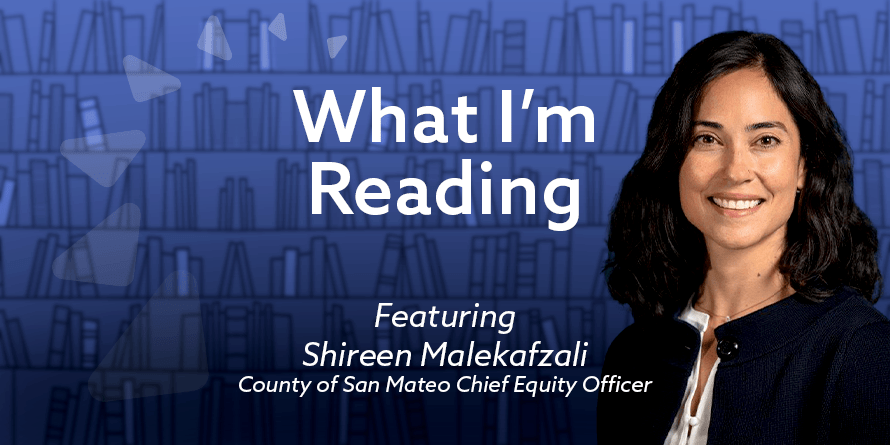 Shireen Malekafzali, opens a new window (she/her) joined the San Mateo County Manager’s Office, opens a new window in April 2021 as the County’s first chief equity officer. In that role, Shireen supports the County to build more equitable structures, policies and practices in order to advance equitable outcomes for our communities.
Shireen Malekafzali, opens a new window (she/her) joined the San Mateo County Manager’s Office, opens a new window in April 2021 as the County’s first chief equity officer. In that role, Shireen supports the County to build more equitable structures, policies and practices in order to advance equitable outcomes for our communities.
“As an immigrant, I worked hard to learn English and make friends while I watched my parents struggle to navigate their way around a new culture, language, jobs, documentation and more," Malekafzali said.
"Everything was hard and foreign, and we never felt like we belonged. I appreciate this effort to develop a comprehensive plan to ensure all immigrant families and individuals feel like they belong in San Mateo County.”
We asked Shireen about what she's reading and some of the books that have made the biggest impact in her life. Read on for her responses.
The book I am currently reading
I’m rereading All About Love by bell hooks. She has been on my mind since her passing and revisiting All About Love has reminded me how much she shaped my understanding of the world. I credit hooks with awakening me to the concept of intersectionality. There are very few people who talk about the complexities of identity – but hooks pushed back and refused to oversimplify herself. She wasn’t only Black, or only a woman, or only her sexuality, she was all of it and much more. At 18 or 19, she helped me come to terms with who I was in the world as a woman of color and an immigrant.
The book that changed my life
The Slave Dancer by Paula Fox. I read it as part of the mandatory reading list around 4th grade. I was a new immigrant to the United States then, and it helped me understand the concept of slavery in America. Not as a history lesson, but how deeply violent and horrific it was as a centuries-long practice. It changed my life and helped me connect to concepts of equity and justice, and inspired further reading. I remember looking for more books and finding a book of letters from African Americans from the South, trying to get to the North. It awakened me to an American history I didn’t learn in history class.
My comfort read
Anything by Pema Chödrön, such as When Things Fall Apart, or Getting Unstuck, or anything else, really. Chödrön is part of the Shambhala tradition, a type of Buddhist teaching with a focus on loving kindness. I’m not Buddhist but I connect with her teachings on life. She has joy in how she describes life and difficult experiences, and shares ways to live life that are beautiful. I also have notes from her lectures that I go back to often.
The last book that made me cry
Was probably The Reason I Jump: The Inner Voice of a Thirteen-year-old Boy with Autism by Naoki Higashida. It just made me realize how difficult it is to be a person with atypical mental processing, and how people view you from the outside, and how different that can be from the inside.
The writer who changed my mind
John Muir, in My First Summer in the Sierra. Muir differentiated for me the concept of resource management from intrinsic value in nature. As an 18-year-old, it helped me solidify an understanding of an ethical system with nature having value in and of itself. It didn’t necessarily change my mind, but helped ground my values and connection to the environment for what and who it is and not just for what nature provides for humans. This understanding inspired me to become an environmental science major, which brought me to the environmental justice movement and my commitment to concepts of justice and equity.
The book I give as a gift
Back to bell hooks. I’m on the board of a national nonprofit called Human Impact Partners, opens a new window, and I just sent each staff a copy of All About Love by bell hooks for the New Year. They had asked me what motivates me to do this work, and I realized it was all about love. All my work to advance equity and justice is rooted in love, and it’s about awakening others to this idea that is hard to describe, and for which I credit hooks with helping me understand. The concept of love has been colonized into being about power and privilege, which makes it hard to truly love. In the book, hooks says that love is something you do, not a thing, and this analysis allows us to move from the romanticized, commercial version of love to a version of love that authentically sees, respects and trusts other people. It’s hard to be able to do that without coming first from a place of equity and justice. How can you authentically, actively love others if love is mired in oppressive concepts from the dominate culture? To truly love others, a family member, a neighbor, a friend, a partner, we must see them for who they really are, what they’ve been through, how they experience the world. We can extrapolate these individual connections to community connections and humanity as a whole.
What I'm Reading is an occasional series of San Mateo County Libraries, where we talk to the San Mateo County community about books! Inspiration taken from The Guardian book pages, always.


Add a comment to: What I’m Reading with Chief Equity Officer Shireen Malekafzali